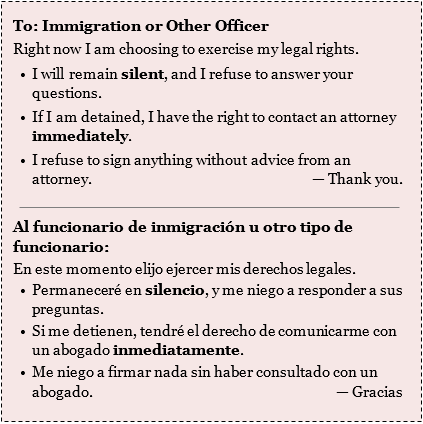
Versión en español | Chinese:* Traditional • Simplified (PDF) |
Arabic* (PDF) | Korean* (PDF)
By now everyone knows that Donald Trump has been elected president of the United States and will begin serving his term in January 2017. No matter who is president, everyone living in the U.S. has certain basic rights under the U.S. Constitution. Undocumented immigrants have these rights, too. It is important that we all assert and protect our basic rights.
If you find you have to deal with Immigration and Customs Enforcement (ICE) or other law enforcement officers at home, on the street, or anywhere else, remember that you have the rights described in this factsheet. The factsheet also provides suggestions for what you should do to assert your rights.
 Carry a know-your-rights card and show it if an immigration officer stops you.
Carry a know-your-rights card and show it if an immigration officer stops you.Because Donald Trump has made many anti-immigrant statements, ICE and other law enforcement officers may think they can get away with violating your rights. Sometimes ICE officers lie to people in order to get them to open their doors or sign away their rights. If ICE detains you or you are concerned that they will conduct raids in your area, this is what you can do:
 Create a safety plan.
Create a safety plan.* Translations into Chinese provided by Brooklyn Defender Services; formatting by Asian Pacific Health Care Venture, Inc. Translation into Arabic provided by Wafa Shami. Translation into Korean provided by Transcend.
Source: "Know Your Rights." National Immigration Law Center (NILC), 10 Nov. 2016. https://www.nilc.org/issues/immigration-enforcement/everyone-has-certain-basic-rights/
 10 DE NOVIEMBRE DE 2016 | Versión en inglés
10 DE NOVIEMBRE DE 2016 | Versión en inglés
Ya es un hecho que Donald Trump ha sido elegido presidente de los Estados Unidos y empezará a servir su término en enero de 2017. Sin importar quien es presidente, todas las personas que viven en EE.UU. tienen ciertos derechos básicos bajo la constitución del país. Los inmigrantes indocumentados también tienen estos derechos. Es importante que hagamos valer y protejamos nuestros derechos básicos.
Si usted tiene que tratar con oficiales de Inmigración y Control de Aduanas (ICE por su sigla en inglés) en la casa, calle, o en algún otro lugar, recuerde que tiene los derechos descritos en este documento. Este documento también provee sugerencias de cómo hacer valer sus derechos.
 Lleve consigo una tarjeta como la de arriba, y enséñela si un oficial de inmigración lo detiene.
Lleve consigo una tarjeta como la de arriba, y enséñela si un oficial de inmigración lo detiene.Dado que Donald Trump ha hecho varios comentarios anti-inmigrantes, ICE y otros oficiales de ley tal vez piensen que pueden violar sus derechos sin consecuencias. A veces, oficiales de ICE les mienten a las personas para que les abran la puerta o para que firmen documentos renunciando a sus derechos. Si ICE lo detiene o si tiene miedo que ellos vayan a hacer redadas en su área, esto es lo que usted puede hacer para protegerse y prepararse:
 Cree un plan de seguridad.
Cree un plan de seguridad.